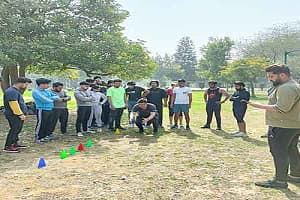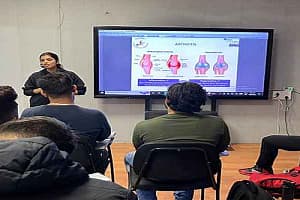How To Become a Nutritionist? Scope and Career Opportunities

Nutrition plays a pivotal role in leading a healthy life. It is a vital element required in every stage of life. Nutritious food intake and metabolism of nutrients are associated with the decreased risk of both infectious and non-communicable diseases. Nutritious diet is a major determinant of future health – physical, mental and social health, not merely an absence of disease.
Why Study Nutrition and Dietetics after 12th?
The objective of pursuing a course in Nutrition and Dietetics is that the student will acquire scientific knowledge of basic sciences and principles of Nutrition and Dietetics. Students will get a broad understanding of clinical nutrition, food science, sports nutrition, public health nutrition and its influence on human health and well-being. They will develop skills pertaining to critical analysis, entrepreneurship and communication for career development in the field of nutritional sciences, and will enhance practical knowledge in the domain of Nutrition and Dietetics for its applications in industry and research.
Courses to Become a Nutritionist
After 12th to become a nutritionist, a student can pursue B.Sc. in Nutrition and Dietetics followed by Nutrition and Dietetics. Sports Nutrition and Dietetics has four major specialized fields of nutrition– Clinical Nutrition, Public Health Nutrition, Food Science and Technology, and Sports Nutrition. All these fields have their scope of working as a nutritionist.
Responsibilities as a Nutritionist
A Nutrition Professional offers guidance to people, families, and organizations on how to change food, lifestyle, and mindset for optimum health promotion. They can work with a licensed healthcare provider to help individuals with previously diagnosed disease recognize biochemical imbalances and toxicity which lead to poor health.
Career Opportunities as a Nutritionist
Clinical Dietitian/Nutritionist: Clinical dietitians work in hospitals, clinics, and other healthcare settings. They assess patients' nutritional needs, create customized meal plans, and provide nutritional therapy for individuals with medical conditions such as diabetes, heart disease, and gastrointestinal disorders.
Community Nutritionist: Community nutritionists work with public health agencies, non-profit organizations, and government agencies to promote healthy eating habits within communities. They might develop and implement nutrition education programs, work on policy initiatives, and advocate for improved nutrition standards.
Sports Nutritionist: Sports nutritionists work with athletes and active individuals to optimize their dietary intake for improved performance, endurance, and recovery. They provide guidance on proper nutrient timing, hydration, and supplements.
Corporate Wellness Nutritionist: Many companies are investing in employee wellness programs, and nutrition plays a significant role in these initiatives. Corporate wellness nutritionists design and deliver programs that promote healthy eating habits among employees, often including workshops, seminars, and personalized consultations.
Research Dietitian/Nutritionist: Research-focused professionals in this field conduct studies to advance our understanding of the relationships between nutrition, diet, and health. Their work contributes to the development of evidence-based dietary guidelines and recommendations.
Nutrition Educator: Nutrition educators work in schools, universities, and community centers to teach people about proper nutrition and healthy eating habits. They might create lesson plans, lead workshops, and develop educational materials.
Private Practice Dietitian/Nutritionist: Private practice professionals offer one-on-one consultations to clients seeking personalized dietary advice and guidance. This could range from weight management to managing medical conditions through diet.
Food Service Manager: Food service managers with a background in nutrition oversee the planning and preparation of meals in various settings, such as schools, hospitals, and large institutions. They ensure that meals meet nutritional standards and dietary needs.
Nutrition Writer/Blogger: With the increasing interest in health and nutrition, there's a demand for accurate and informative content. Nutrition writers and bloggers create articles, blogs, and other content to educate the public about various aspects of nutrition and dietary choices.
Consultant/Advisor: Nutrition consultants work with various organizations, businesses, and individuals to provide expert advice on nutrition-related matters. This could include menu planning for restaurants, advising food manufacturers, or offering expertise to wellness startups.
Media Spokesperson: Some registered dietitians and nutritionists become media personalities, appearing on TV shows, podcasts, and radio programs to discuss nutrition-related topics and provide expert insights.
It's important to note that pursuing a career in dietetics and nutrition generally requires relevant education and credentials, such as a bachelor's or master's degree in nutrition or dietetics and registration or certification from a recognized professional organization like the Classic Fitness Academy. Additionally, staying updated with the latest research and trends in the field is crucial to providing accurate and up-to-date advice to clients and patients.






